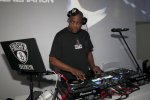Gill Scott-Heron – The God Father of MC-ing
Gil Scott Heron: Hip-Hop Progenitor Makes His Transition
Fearless cult-icon – who helped inspire Hip-Hop’s founding fathers and sparked a legion of MCs – initiated his transition this past Friday afternoon [May 27th] at Harlem’s St. Luke Hospital at age 62. Gil Scott-Heron was admitted after feeling ill upon returning from a recent European tour.
He was born in Chicago on April 1st 1949, relocating to Jacksonville, Tennessee a couple years later after his parents divorced. Gil lived there with his maternal grandmother until she transpired when he was just 12, only to then relocate to The Bronx with his mother where he attended Dewitt Clinton HS.
Following in the footsteps of one of his literary inspirations, Langston Hughes, he enrolled at Lincoln University in Pennsylvania where he not only teamed up with musician and future ‘Blacks & Blues’ band-mate Brian Jackson, but also where he initially met one of his greatest influences…
Gill Scott Heron SpeakingOn White People Stealing Black Coulture
“We had gone to Lincoln University in 1968 to do a show and it was nice because it was ‘Black Power’ time and the place was packed,” recalls Abiodun Oyewole of the legendary Last Poets. “Gil came into our dressing room and says… ‘Yo, I want to start a group like you guys.’ I said, ‘Gil, we want Last Poets all over the world, because we’re trying to start a revolution! Go for it!’”
Adding:
“Gil took us very seriously and went on and did an album called, ‘Small Talk On 125th Street’ and on there he did ‘The Revolution Will Not Be Televised.”
Gill Scott-Heron feat Nas & Mos Def – “NY Is Killing Me”
‘Black & Blues’ fused jazz, soul and blues music along with the socially-conscious spoken-word and/or sung commentary which vividly depicted the grim realities many Americanized-Africans endured in the United States then, calling it ‘bluesology’.
Scott-Heron is genuinely regarded to be one of the greatest songwriters/poets of all times. He is a Hip-Hop progenitor who has been studied by, and helped influence, most prominent MCs since the urban-culture’s inception. His signature pieces include: “The Bottle,” “Home Is Where The Hatred Is”, “Ain’t No Such Thing As Superman”, “Winter In America” and “The Revolution Will Not Be Televised.”
His songs addressed topics like: police brutality [Jose Campos Torres, No Knock], racism [The klan], alcoholism [The Bottle], corrupt politicians [Watergate Blues, Pardon Our Analysis], apartheid [Johannesburg], reparations [Who’ll Pay Reparations On My Soul], Amerikkka’s concentration camps [The King Alfred Plan], results of war [Did You Hear What They Said?].
“I said, ‘When the revolution comes’, and Gil simply said, ‘It won’t be televised! You’re not going to see that Isht on NBC or ABC.’ He graduated my stuff. I appreciate Gil. We were brothers for life!” asserted Abiodun.
The Watts Prophets, The Last Poets and Gil Scott Heron initiated many inner-city youths to educate themselves about their origin, then relay those tales verbally to their peers. This inspired some to be the catalyst which brought about positive social changes in their dilapidated communities.
His distinct unquivering delivery, along with his non-compromising, soulful messages, which detailed many of society’s ills in America, captured the climate and sentiment of many angry Amerikkkanized-Afrikans, leading some to label him as the godfather of MC-ing.
The information often delivered on the concrete corners by street scholars were now being articulated over thumping percussion patterns instead. His art reflected the climate of when the militant Malcolm X, the Five Percenters and the Black Panther Party were major forces in Harlem.
Black Panther, Tarik Haskins remarked on Scott-Herons social-impact during the 1970s:
“Gil’s music was like the tide coming in. It contributed to the atmosphere of revolution. We would be impacted on a personal level when we would turn the radio on and hear Gil say ‘The revolution will not be televised!’ It was an important contributor for us maintaining our revolutionary spirit.”
Tarik concurs:
“He played a very significant part in the revolution. All of us knew his music, and that was like knowing him. The first rappers were revolutionaries/conscious, and they would try to impart a lot of information to the audience, and I’m sure Gil had inspired them to do that.”
Scott-Heron’s ability to speak truth to power stimulated a generation of MCs to do the same. Regardless of soul and funk’s mainstream success, revolutionary music can never be suppressed. Gil’s art challenged the establishment’s mental-grip on the masses, motivating the oppressed to seek and bring about change.
“Our enemies saw the impact that Gil had on people, and they saw that he had inspired all the conscious rappers and that’s when they put the breaks on conscious Hip-Hop and hit us with gangster rap,” Haskins determined.
Oyewole reflects: “Because Gil is the only popular guy who did poetry and sang – he got that space and he mastered it and I was very, very proud of what he did.”
Although original people have been breathing over rhythmic drum beats since time immemorial, the socio-political messages depicting urban pain during Amerikkka’s Black Power era laid down the groundwork for Hip-Hop music. It is one reason some label him as the godfather of rap, a term he rejected.
“It might have been that there was music in certain poems of mine, with complete progression and repeating ‘hooks’ which made them more like songs than just recitations with percussion,” he wrote in a 1990 intro to a collection of his poems.
KRS-One – “The Revolution Will Not Be Televised [Nike Commercial]
Culture and resistance to oppression can never be divorced. Gil Scott Heron’s music has been sampled by and/or inspired numerous Hip-Hop artists, including: Melle Mel, DJ Marley Marl, KRS, Rakim, Public Enemy, Tupac, Dr. Dre, AZ, The Coup, dead prez, Common, Mos Def, Nas; just to mention a few. The music to the title-track for Masta Ase’s debut album ‘Take A Look Around’, is looped from The Revolution Will Not Be Televised.
His thought-provoking lyrics inspired a whole generation before Hip-Hop got COINTELPROed.
“Gil left us a volume of work that speaks for itself and can’t be denied. We’re supposed to listen and learn from it. If you can write, try to parrot it somehow with your own ideas,” Abiodun suggested.
The revolution will not be televised because it will be live! Peace go with you brother.
Gill Scott Heron – “Message To The Messengers”















